
Freshfel Europe Headlines – Edition 5, 2023
Freshfel Europe’s Headlines publication provides an overview of the Association’s most recent activities.
For more information about Freshfel Europe’s activities please contact the Freshfel Europe Secretariat.

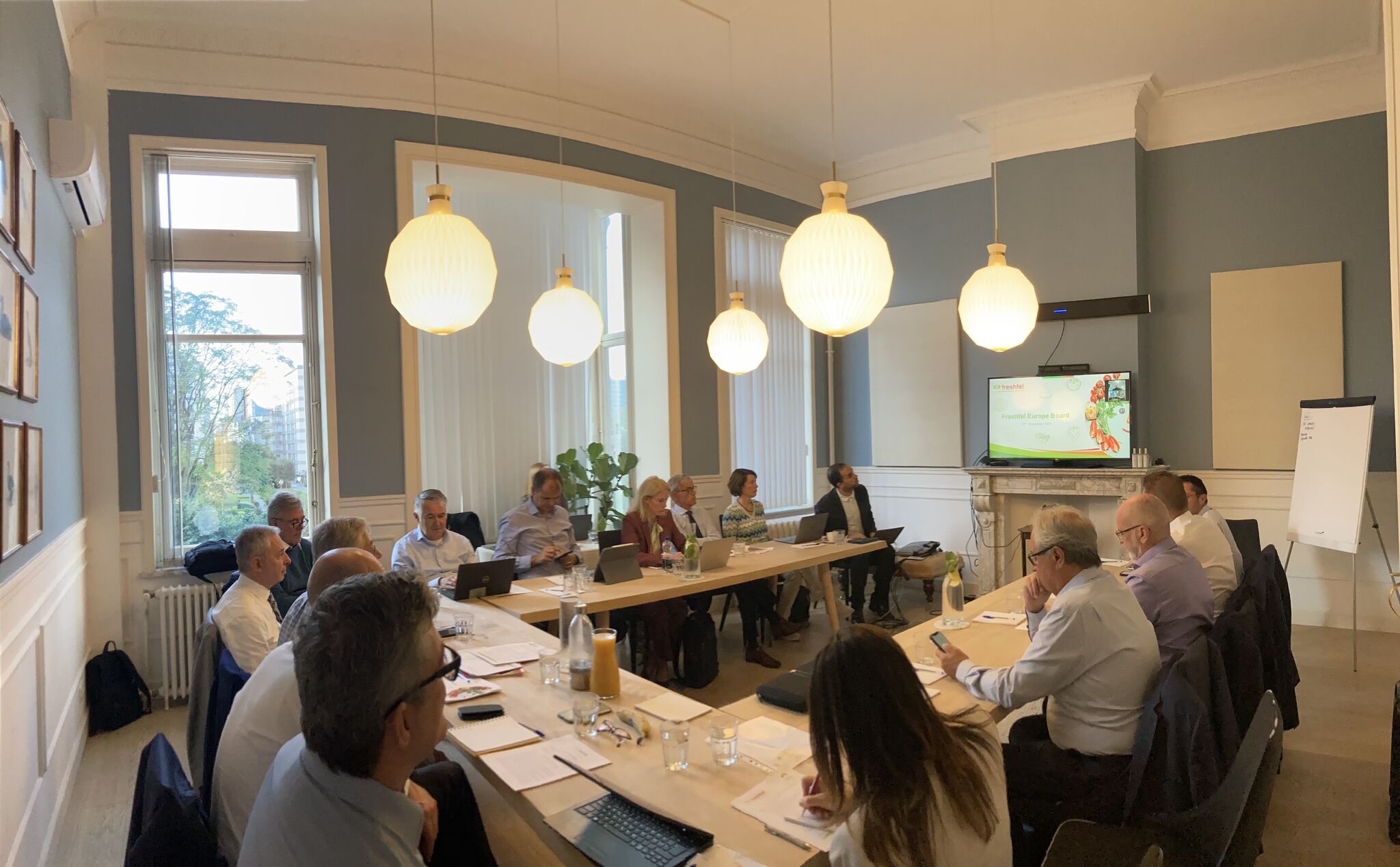
Freshfel Europe’s two-day annual event discussed climate change, policy coherence and the sector’s image
On the occasion of the Freshfel Europe autumn Board meeting various networking and advocacy meeting took place including a dinner with various Members of the European Parliament, co-hosted together with MEPs Paolo de Castro and Jérémy Decerle, where the Freshfel Europe board members exchanged impressions on the situation and the future of the sector with lawmakers, particularly with an eye on the next legislature after the June 2024 elections. This was followed by the board meeting and a luncheon with European Commission officials.
During the board meeting, Freshfel Europe’s board members reviewed the latest state of play on sustainability matters highlighting the low environmental footprint of the sector and its high health and nutritional benefits for consumers but also agreed that there are ways in which the sector can further improve upon its already high standards and further contribute to sustainability and rural development.
The room stressed that any positive changes, and in particular those aimed at addressing pressing issues like the negative impact of climate change and environmental degradation, require support from policymakers and policy cohesion, which, in the opinion of the sector, is lacking.
The two-day event concluded with a luncheon with Commission officials where Freshfel board members discussed at length production and trade policy, marketing standards, promotion policy and urged the Commission to monitor and ensure the good functioning and unity of the Single Market to prevent the rise of local protectionism under different guises.


Freshfel Europe and the European Commission discuss ongoing protocols for exports to India
Within the context of the current talks of FTA between the EU and India and the upcoming HLM of Commissioner Wojciechowski in India, Freshfel Europe met with officials from the European Commission’s Trade Directorate to discuss the opportunities for solving and enacting the numerous protocols that remain pending for EU fresh fruit and vegetable exports to the Indian subcontinent.
Freshfel Europe and Commission officials worked off the list of pending protocols from Spain, Greece, Italy or Germany among other EU countries, and in consultation with Freshfel members, to establish a list of priority applications and to push Indian authorities to deal with all other existing applications in a more speedy and transparent manner. Freshfel Europe also continues to call for the removal of red tape for EU exports to India, including India’s requirement for a non-GMO certificate for fruit and vegetables.
In addition, Freshfel and Commission officials also went over the Commission’s list of pending applications in its MADB portal to ensure the up-to-date nature of the existing entries to ensure that stakeholders, Commission officials and Member States all have access to accurate and up-to-date information concerning the pending applications for fresh fruit and vegetable PRAs.

Freshfel Europe delivers an overview of EU-China fruit and vegetable trade during China’s export and import fair
Freshfel Europe’s General Delegate, Philippe Binard, delivered before an audience of Chinese companies and officials in the import-export sector a presentation about the China-EU trade of fresh food and vegetables after the end of the COVID-19 pandemic, highlighting the challenges and opportunities.
Freshfel presented the latest figures in the EU-China trade, focusing on the recovery of trade since 2021, albeit with the caveat that figures remain far below pre-pandemic, and with a continuing trade deficit which has however narrowed since 2020 as EU imports from China have decreased. Freshfel also provided a comprehensive overview of the exports overview both by country and product and noted how EU exports are dominated by kiwis, oranges, and pears in equal parts whereas Chinese exports mostly consist of grapefruits and onions.
In addition, Freshfel Europe reviewed with CIQA counterparts the difficulties European exporters face in trading with China, including the reduced number of export protocols, issues with export registration lists, and various customs delays and other difficulties linked to the implementation of decree 248, as well as Freshfel Europe’s overall vision for fresh produce trade worldwide.
Freshfel Europe also highlighter to Chinese business partners the various facets of EU agri-food policy, with a focus on its promotion efforts and sustainability as well as an analysis of the attractiveness of the Chinese market, noting its potential for EU producers if some of the current issues are solved, albeit noting that China’s domestic market is highly complex due to its size and the large size of domestic production.


Freshfel Europe stays proactive on sustainability reporting under the CSRD
Starting next year, the first cohort of companies affected by the Corporate Sustainability Reporting Directive (CSRD) will have to start collecting data for their first report to be delivered in 2025. To prepare for the fresh produce sector, Freshfel Europe organised an in-person meeting to discuss what concrete steps can be taken to organise and streamline sector efforts in this area. At the meeting, experts on CSRD from the European Financial Reporting Advisory Group (EFRAG), Deloitte and FTI Consulting also attended the meeting to increase technical knowledge and discuss possibilities of joint approaches.
Subsequently, a small Working Group within the Freshfel Membership has been set up with the ambition to coordinate common efforts of the fresh produce sector on endeavours such as double materiality assessments, and pooling of resources but also proactively preparing for sector-specific standards, the EU Taxonomy and other upcoming policies.
The value of the project extends beyond compliance however and will also be a way for the sector to align on the benchmarking and communication of environmental, social and governance (ESG) topics. This will help the sector display its good practices, its ambitious developments on sustainability, and ensure transparency to consumers.
The project is open for companies within the Freshfel Europe full membership, as well as to selected external companies on a case-by-case basis.

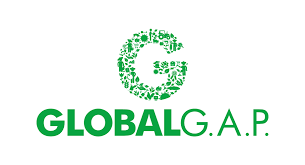
The fresh produce sector and GLOBALG.A.P.’s public consultation on sustainability standards
GLOBALG.A.P., a global standard-setting body for good agricultural practices, are conducting a consultation process to develop new sustainability standards to include either as add-ons to existing certifications or to be used as stand-alone certification. The first public consultation was open until 27 October, including a one-week extension period that was granted following the advice of Freshfel Europe and other actors.
As the GLOBALG.A.P. standard is widely used within the fresh produce industry, Freshfel Europe was asked by its members to serve as a platform to communicate the input of the sector. For this purpose, Freshfel Europe has set up a small Working Group within its membership which will coordinate the gathering of input and formulating the contribution of the sector. Freshfel Europe is also keeping in close contact with the GLOBALG.A.P. secretariat coordinating the consultation and will be joining relevant working groups to provide comments and input.
In light of the proliferation of sustainability standards and certification, both voluntary and legally required, Freshfel Europe stresses the importance of allowing the consultation process more time. A rushed process risks creating standards that are either not ambitious enough, not feasible for operators to comply with, or misaligned with legal requirements. Freshfel Europe is continuously exchanging with both members and GLOBALG.A.P. to ensure the consultation produces achievable and realistic outcomes without compromising on ambition.

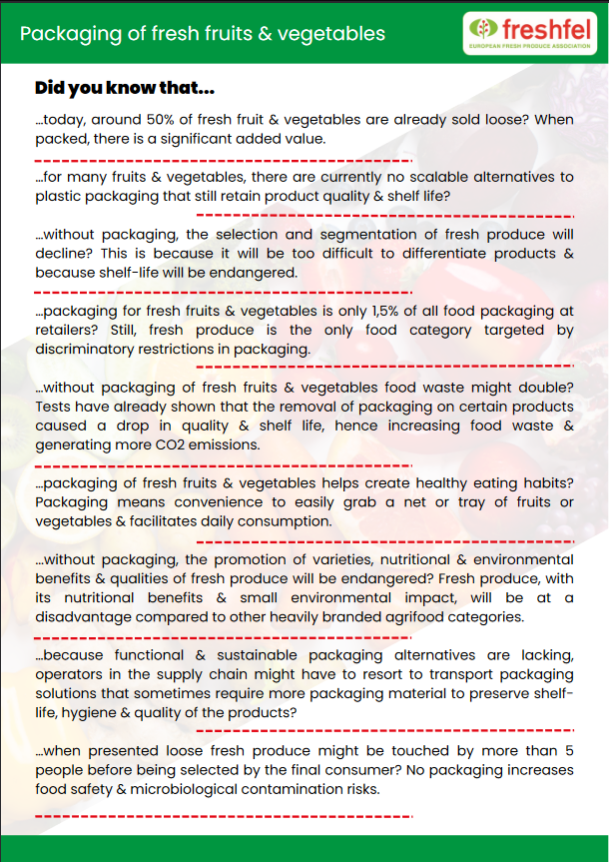
Continued negotiations on the Proposal for Packaging and Packaging Waste
Balancing the multifaceted and complex landscape of packaging for fruits and vegetables in the EU continues to be one of the main priorities of Freshfel Europe. In early September, Freshfel Europe hosted a webinar with its members to review updates in EU and national legislations, and to look ahead at packaging trends, materials, alternatives and solutions. Currently, there are no feasible alternatives to single-use packaging for fresh produce, and the patchwork of national legislation combined with the uncertain outcomes of the Proposal on packaging and packaging waste create an unfavourable environment for investments.
In the final phases of negotiations within the European Parliament’s Committee on Environment, Public Health and Food Safety, the lead committee on the Proposal, Freshfel Europe shared with them the importance of not imposing disproportionate and discriminative restrictions on a specific sector as has been done through Article 22, Annex V, point 2 in the directive. Fresh produce, which only uses on average 1,5% of all packaging used for food in Europe and are highly perishable and sensitive products, should be allowed to use packaging according to the targets and requirements set out in the proposal as applies to every other sector.
As the European Parliament have now decided on their final position on which to enter trilogues, Freshfel Europe is turning its attention towards the discussions in the Council, the Belgian presidency which will be taking over in January 2024, and in Member States.
Freshfel Europe also reiterates, to both the European Parliament and the Council, the priority that must be given to harmonising packaging legislation on the Single Market. Diverging measures will severely obstruct the availability and movement of fresh produce and increase the waste of food and packaging

Freshfel Europe’s webinar on food additives
Freshfel Europe hosted a webinar reviewing the latest updates on food additives. The session included an update by the European Commission, DG Sante on pending applications of new authorisations and extensions of uses; update on the position of the EU MSs regarding food additives on F&Vs; food additives in the framework of the Farm-to-Fork Strategy & policy coherence; future policy developments in the area of food additives.
The presentation of the European Commission was followed by a discussion and an internal evaluation concerning the future of the European food additive policy.

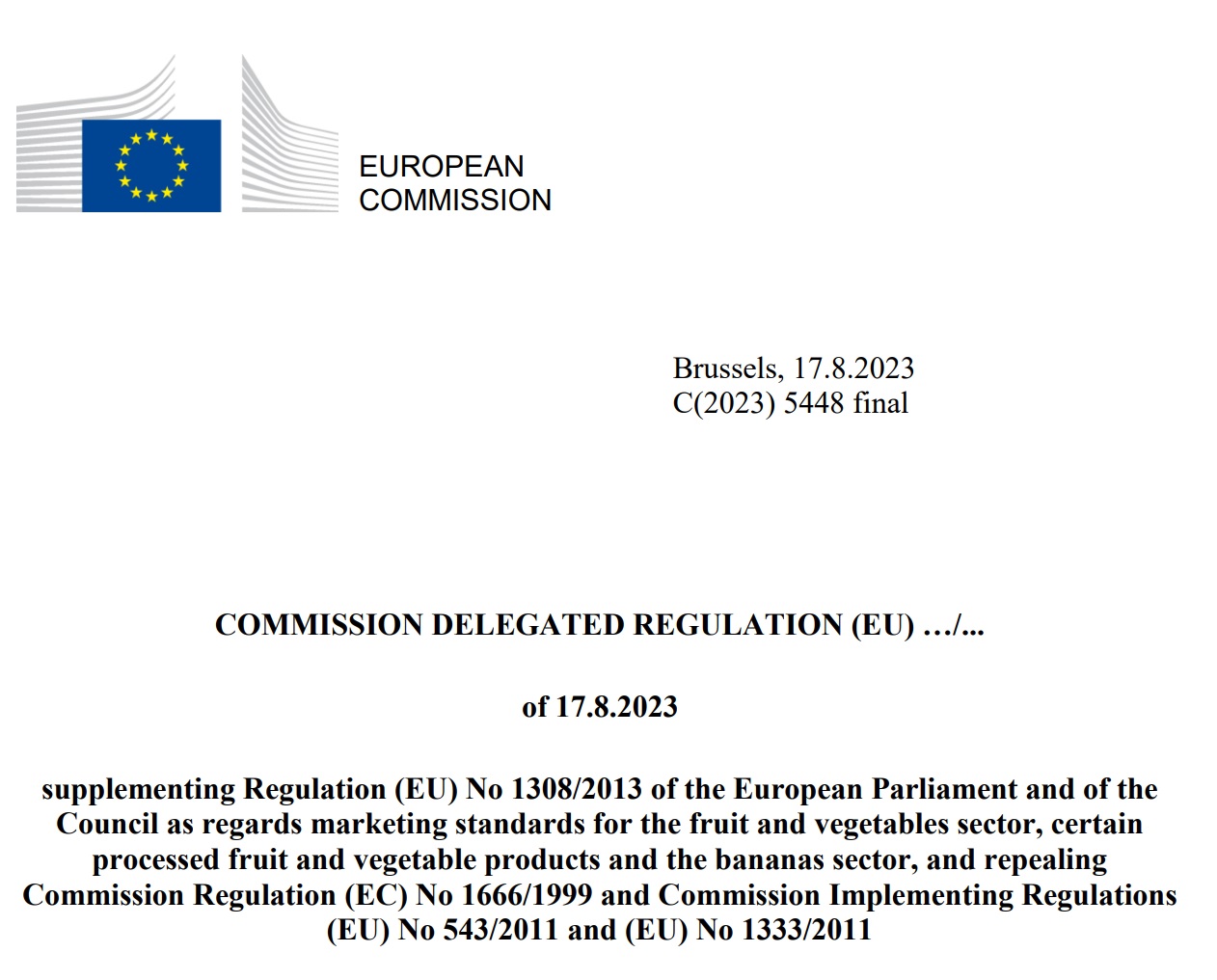
Marketing standards: adoption of new marketing standards for fruit and vegetable sector and the banana sector
Earlier this fall, the European Commission adopted a draft Commission Delegated Regulation supplementing Regulation (EU) No 1308/2013 as regards marketing standards for the fruit and vegetables sector, certain processed fruit and vegetable products and the bananas sector.
The draft Delegated Act includes numerous changes compared to currently applicable Commission Implementing Regulation (EU) No 543/2011, such as:
- revise the rules applicable to the general and specific marketing standards.
- imposes the origin labelling of IV gamma products;
- includes provisions that additional terms which suggest better/superior quality may not be included. In particular, the label may not include any descriptor of quality except the information specified in the marking requirement;
- includes a new provision regarding information particulars before the purchase is concluded, including the single country of origin of the product actually offered for sale;
- includes a new provision regarding the size of characters that indicate the country of origin when the packer and/or the dispatcher is indicated or when the variety indicated evokes a location.
- specific changes linked to specific marketing standards, including bananas.
Following the adoption of the draft, Freshfel Europe sent a letter to the European Commission. The banana sector welcomed new provisions included in the text regarding the reduction of food waste and food loss in the context of the Farm-to-Fork Strategy, notably by improving greater flexibility for the portioning of bananas.
This simplification of the text which no longer limits the number of fingers per hand is greatly welcome and will benefit all actors of the value chain, from producers to consumers. However, the industry remains concerned regarding the timeline foreseen for the application of new rules. In the letter, the banana sector stressed that the objectives set under the Farm-to-Fork strategy of the European Commission which do not pose any barriers to daily operations or controls of the EU should be implemented upon the entry force of the Delegated Act in order to reduce waste of banana.

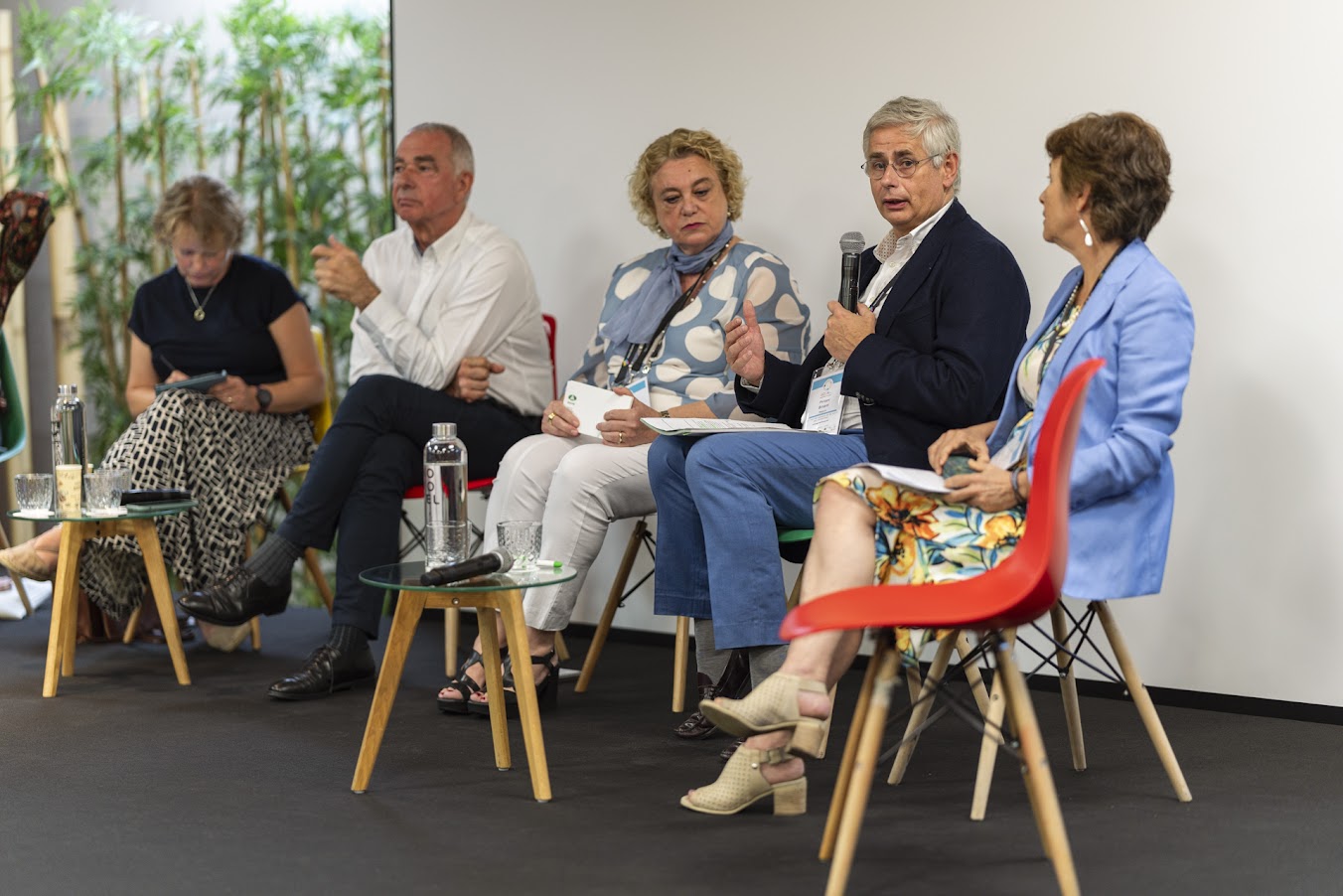

Freshfel Europe at the EGEA Conference on the science behind fruits and vegetables and One Health.
In late September Freshfel Europe participated in the ninth edition, and 20th anniversary, of the EGEA Conference. The three-day event is organised by Aprifel, the French Agency for research & information on fruit & vegetables. This year’s theme was “Diet, Fruit and Vegetables, and One Health: What Contributions?” and featured several high-level policy and scientific speakers from around the world and across disciplines.
The conference included sessions on the nutritional and health values of fresh produce, environmental and social impacts and levers of fruits and vegetables and determinants of consumer behaviour and choices. Freshfel Europe’s General Delegate Philippe Binard participated in a panel discussion on how to make sure that fruits and vegetables are placed at the centre of the One Health discussion, emphasising that the contradictions between intention and action must be addressed. Although there is a lot of awareness and good intentions from both consumers and policymakers, there is still an issue of translating these into concrete actions and well-functioning policies.
To follow up on the meeting, Freshfel Europe organised an online call with members to discuss the promotion of fresh produce, and what actions can be taken to communicate and disseminate information on the benefits of fruits and vegetables. At the meeting it was decided that Freshfel Europe will coordinate actions to boost the interaction between scientists, stakeholders and policymakers active in the area of fruits and vegetables. A meeting between Freshfel Europe, Aprifel and the Commission services to discuss the outreach of the EGEA conference will take place in early January.


The Global Coalition of Fresh Produce hosts a webinar on economic sustainability in the fresh produce supply chain
On 19 September the Global Coalition of Fresh Produce, of which Freshfel Europe is part, successfully held its first webinar for the global fresh produce industry, titled Economic sustainability in global supply chains for fresh fruits and vegetables. Over 200 commercial operators, industry representatives, national and international officials and academics registered to attend the webinar, logging in from countries as diverse as Canada, Ecuador, Italy, Uganda and New Zealand, to name but a few.
The webinar was built around the results of a recent survey conducted by the Coalition, which reviewed the distribution of costs and margins across the fruit and vegetable supply chain. The survey showed that less than half of all fruits and vegetables sold worldwide are making a profit for producers and that cost hikes during and after the COVID epidemic, for example for fertilizers, energy and shipping, continue to impact producers of fruits and vegetables the world over.
The webinar featured presentations by experts in the global fresh produce industry, including Cindy van Rijswick, global strategist at Rabobank, Alan Renwick, professor of agricultural economics at Lincoln University, and Niccolò Ciulli, advisor at EuroCommerce.
However, despite these difficulties – which add to the challenges for producers that result from our increasingly variable and changing climate – panellists agreed that the global fresh produce industry is inherently dynamic and resilient; in addition, fruits and vegetables are key elements in the global shift towards healthier and environmentally sustainable diets. This will be the focus of the Coalition’s next two seminars, on environmental sustainability and on the consumption and promotion of fruits and vegetables (the dates of which are to be confirmed).
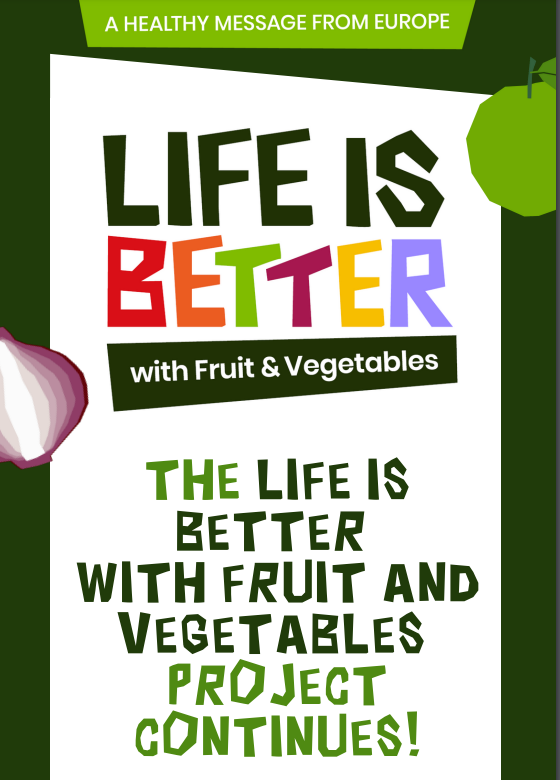
Life is Better with Fruit and Vegetables – Newsletter #6
The sixth edition of the newsletter of the Life is Better with Fruit and Vegetables campaign is now available at this link.
Life is Better with Fruit and Vegetables is an EU-funded programme that targets Millennials and aims to increase their level of knowledge regarding the nutritional benefits, versatility, sustainability, and practicality of fruit and vegetables. Young Europeans aged 25 to 35 represent a key demographic of consumers, as they are still shaping their purchasing and eating habits.
The campaign, which was officially launched during a press conference on the occasion of Freshfel Europe´s Annual General Meeting on 18 May 2022, will run until February 2025 and will take place in France and Ireland, in addition to having a pan-European dimension. It involves Interfel, AIB, Bord Bia, and Freshfel Europe.
All the material of the project is available on the website of Life is Better with Fruit and Vegetables, with a dedicated webpage for each of the target countries of the campaign (France and Ireland, in addition to Germany, Italy, Poland, and Spain).
